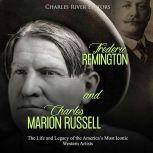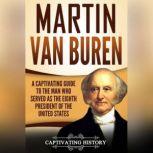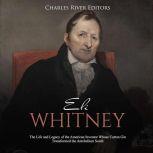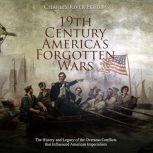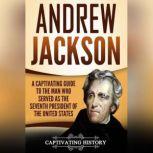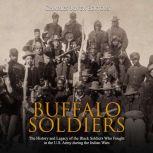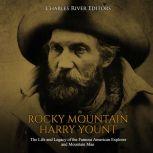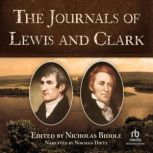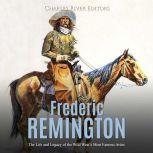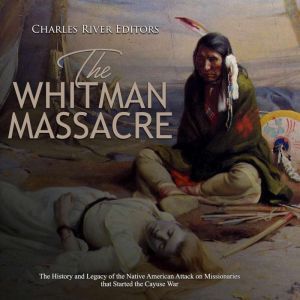
Details
Whitman Massacre, The: The History and Legacy of the Native American Attack on Missionaries that Started the Cayuse War
Author: Charles River Editors
Narrator: Scott Clem
Unabridged: 1 hr 45 min
Format: Digital Audiobook
Publisher: Findaway Voices
Published: 05/06/2019
Synopsis
At the start of the 1840s, the Oregon Country had no political boundaries or effective government. The only administrative organization in the territory was the Hudson’s Bay Company, which applied only to British subjects, and aside from natives, the region was populated by a handful of independent traders, hunters, and prospectors, as well as those employed in the various company depots.
The first to begin showing up in large numbers were missionaries. The native populations were by then diminished by disease and dispirited, which meant they were more receptive to missionary aid and the Christian message. Christianity, of course, was not entirely unknown among the indigenous populations, given that marriages between white men and Indian women created a hybrid of “folk” Christianity that was commonly observed among the Indians. The first wave of missionaries represented the American Methodists, arriving in or around 1834, followed a year or two later by a second series of arrivals, sponsored this time by the American Board of Commissioners for Foreign Missions (ABCFM). The ABCFM was an ecumenical organization founded to promote the general outreach of the Presbyterian and Dutch Reform churches in the United States. Roman Catholics arrived around 1830, bringing missionaries mostly from Canada and Europe.
Perhaps the most famous missionary party of this era consisted of a Presbyterian missionary group including Marcus Whitman and his wife Narcissa, who established their mission on the confluence of the Walla Walla and Columbia Rivers. The Whitman Mission later became an important staging post on the Oregon Trail. The fortunes of the Whitman Mission, however, became something of an object lesson in race relations in the new territory, ultimately with very tragic results.
The mission was well funded, and its settlement, at least by the standards of native society, was lavish. Initially, the couple and their followers treated the neighboring Cayuse tribe with generosity, distributing material largess as well as medicine and rudimentary education. The relationship between the two parties, however, was complicated, and Marcus Whitman appeared to grow disenchanted with persistent demands for material goods made upon the mission. Eventually, he stopped providing goods, which sowed a certain amount of discontent among the Cayuse, and animosity took root. When an epidemic of measles swept through the community, killing hundreds of natives, they blamed the mission for poisoning them. In November 1847, Marcus and Narcissa Whitman, along with 11 other missionaries, were massacred by a Cayuse war party.
That attack would have profound implications not only for the Cayuse and other native tribes of the region, but also for the future direction of the territory. The immediate aftermath brought conflicts known as the Cayuse Wars, which resulted in the banishment of the native peoples of the region to reservations and galvanized the federal government to act over the status of the Oregon Country.
In May 1848, the former mountain man Joseph Meek arrived in St. Louis after an overland journey from Oregon in the dead of winter, announcing himself as the “Envoy Extraordinary and Minister Plenipotentiary from the Republic of Oregon to the Court of the United States.” In fact, Joseph Meek was a representative of the provisional government sent to plead for the establishment of U.S. “Territory” status for Oregon. The essential message that he carried on behalf of the provisional government was that if the United States had attended to its duties earlier, the Whitman Massacre and subsequent violence might never have happened. In time, far more resources would be pumped into the area, both in terms of material and soldiers, and the region would go on to form several new states.
by Charles River Editors
Many of the first artists in the West were assigned to exploration and geological parties, working as archivists and obedient to demands of cold accuracy. However, a few were driven by an imaginative mix of real events and fantastical visions to whe...
Published: 03/16/2020
by Captivating History
Explore the captivating life of Martin Van Buren History chiefly remembers Martin Van Buren as the eighth president of the United States (1837- 1841). He was also, however, notable for achieving many firsts in American politics. He was th...
Published: 06/04/2018
by Charles River Editors
In the 1600s, cotton and silk fabrics that bore colorful and exotic printed patterns, known as “calico,” were flying off the shelves of the East India Company’s stores. The rapidly escalating demand for calico had taken a visible ...
Published: 10/16/2019
by Charles River Editors
By the second half of the 19th century, still less than a century old, the United States had become a regional power. It had soundly defeated its southern neighbor, Mexico, and greatly enlarged itself in the process. America’s navy and mercha...
Published: 02/09/2020
by Captivating History
Explore the captivating life of Andrew Jackson!When Jackson left the White House after two presidential terms, he had achieved a rare feat: He left office with even more popularity than when he first entered it. His reputation as a strong president ...
Published: 07/25/2018
by Charles River Editors
During the Civil War, over 180,000 black men fought in volunteer units as part of the United States Colored Troop (USCT), but it was only after the end of it that they were allowed to enlist in the Regular Army. They did so in four segregated regime...
Published: 12/27/2019
by Charles River Editors
By the golden age of the mountain man in the mid-19th-century, there were perhaps only 3,000 living in the West. Their origins were disparate, although they included many Anglo-Americans. A good number hailed from wilderness regions of Kentucky and...
Published: 04/18/2019
by Nicholas Biddle
In 1804, President Jefferson asked two Virginians-Meriwether Lewis and William Clark-to lead an expedition into the unexplored wilderness of North America. The journals of these explorers are both a priceless piece of national history and a great ad...
Published: 03/04/2008
by Charles River Editors
Many of the first artists in the West were assigned to exploration and geological parties, working as archivists and obedient to demands of cold accuracy. However, a few were driven by an imaginative mix of real events and fantastical visions to wh...
Published: 03/16/2020

